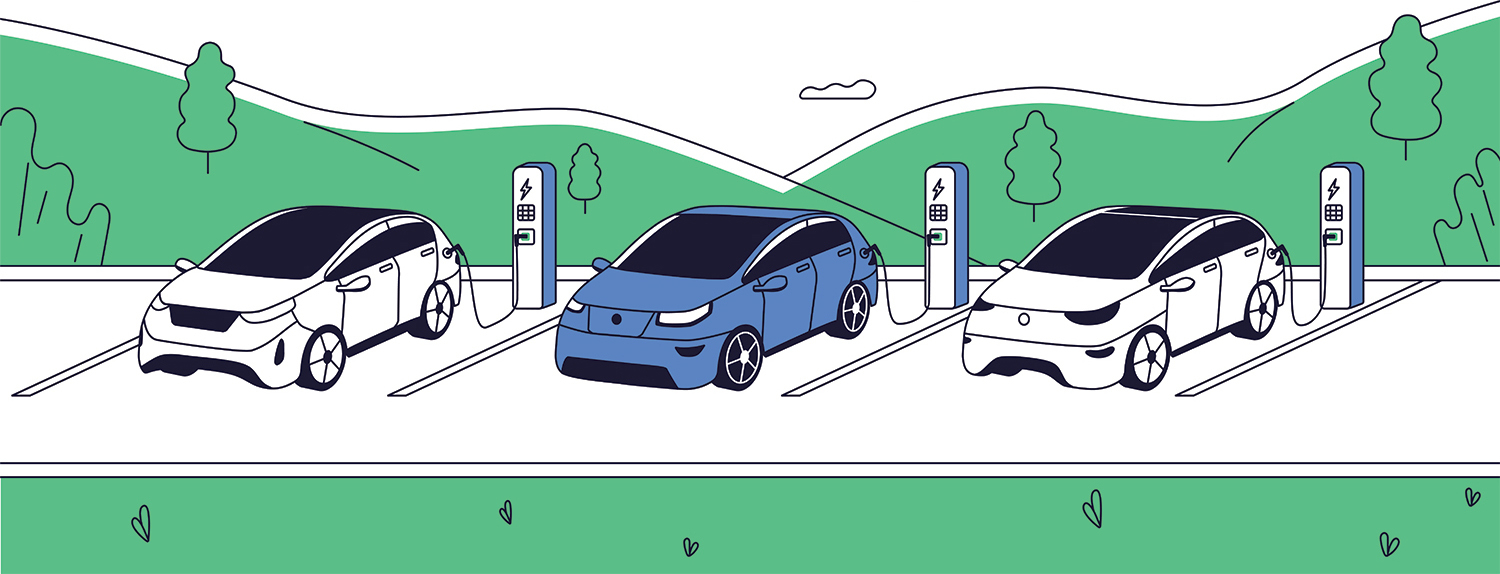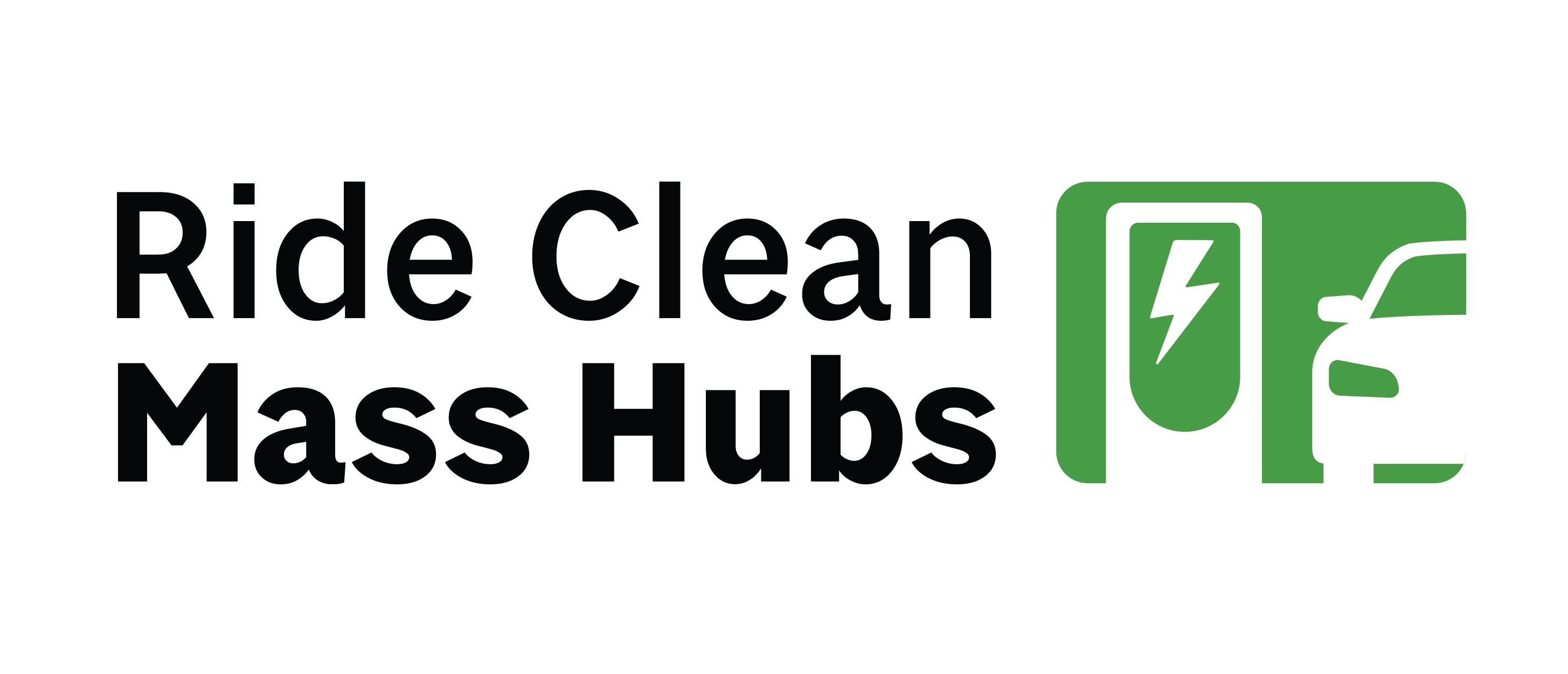
MassCEC / Clean Transportation / Funding / Ride Clean Mass Hubs

The Challenge: Increase Access to Charging for Vehicle-for-Hire Drivers
Limited access to public EV charging is a major barrier to electrifying Massachusetts' Vehicle-for-Hire (VFH) sector. Rideshare and taxi drivers require fast, reliable public charging, yet existing infrastructure often falls short of their needs. Expanding charging options for these high-mileage, low- to moderate-income drivers is critical to advancing the Commonwealth’s goals of transportation electrification, equity, and decarbonization.
About Ride Clean Mass Charging Hubs
The Ride Clean Mass Charging Hubs (RCM Hubs) Program is helping businesses and municipalities host 5–7 strategically located EV charging hubs across Massachusetts. Selected site hosts—potentially including grocery stores, gas stations, hotels, hospitals, and other high-traffic locations—will receive over $1 million in state-funded investment to install public fast chargers, attract more visitors, and support clean transportation. This is a unique opportunity to enhance a facility while playing a key role in building a more sustainable, EV-ready future.
The program is no longer accepting applications.
Learn about our other electric vehicle charging infrastructure programs.
Project Timeline
This program is designed to be as seamless as possible for site hosts. The RCM Hubs team will handle the technical and financial heavy lifting, while hosts primarily need to stay responsive and ensure site access throughout the process.
Timeline |
Applicant/Host Responsibilities |
|---|---|
Mar – May 2025 |
Apply to be a Site Host (Round 1). Complete application; respond to follow-up questions, help coordinate site visits. |
Jun-Aug 2025 |
Utility Engagement Round 1. Be responsive to inquiries regarding site logistics, permitting, and utility coordination. |
Sep 8 – Oct 3, 2025 |
Apply to be a Site Host (Round 2). Complete application; respond to follow-up questions, help coordinate site visits. Applications from Boston/Metro North will be prioritized. |
Oct-Dec 2025 |
Utility Engagement Round 2. Be responsive to inquiries regarding site logistics, permitting, and utility coordination. |
Dec 2025 |
Final Site Selection. Review and sign participation agreements; provide any necessary site-specific details. |
Q1-Q2 2026 |
Begin maintenance and data collection. Hosts must allow site access for construction teams; coordinate on permitting and site logistics; report any operational concerns to the project team. |
Q2-Q4 2026 |
Ongoing maintenance and data collection. Hosts must ensure sites remain accessible 24/7, clear snow, and report maintenance needs promptly. |
Resources
RCM Hubs Recorded Webinar
The program team previously hosted a pre-application webinar with information about eligibility, budget, and the application process. Watch the recording:
Frequently Asked Questions
What are DCFC? How fast do they charge?
DC Fast Chargers (DCFC) provide high-speed charging for electric vehicles, significantly reducing charging time compared to standard Level 2 chargers. Depending on the vehicle and charger, DCFC can typically charge an EV to 80% in 20-45 minutes, making them ideal for drivers who need quick turnaround times.
Who will own the stations?
Once installed, the site hosts will own the stations and have full control over their operation.
Who will maintain the stations?
The program has partnered with a leading EV charger service provider to offer 24/7 maintenance and support. The program will fully cover maintenance costs for the first five years to ensure reliable service.
Program Background
RCM Hubs is funded by the Massachusetts Clean Energy Center (MassCEC) and managed by CALSTART to expand access to public fast charging for high-mileage drivers, including Uber, Lyft, and taxi drivers. We work with the Center for Sustainable Energy, Green Energy Consumers Alliance, and Better Together Brain Trust (BT2) to make EV adoption more accessible and practical for rideshare and taxi drivers.
Explore other clean transportation initiatives at:
Join us in building a cleaner, more connected Massachusetts!
MassCEC / Clean Transportation / Funding / Ride Clean Mass Hubs
RELATED OPPORTUNITIES
School Bus: Advisory Services Program
No-Cost Advisory Services
Rolling
Mass Fleet Advisor
No-cost services
Rolling
Clean Energy Internship Program for Employers
$4,320/intern for Fall or Spring session; $8,640/intern for Summer session or for Construction, Installation, and Maintenance